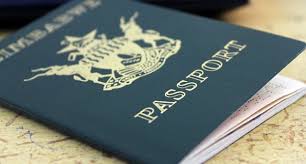Staff Reporter
President Emmerson Mnangagwa is expected to launch the Electronic Passport (e-passport) at Chiwashira Building in Harare today.
In a statement, the Ministry of Home Affairs and Cultural Heritage said that the launch of the e-passport by President Mnangagwa constitutes an important milestone for the country as it marks the nation’s adoption of this critical document that bears more robust security features.
“The e-passport will protect the privacy of our citizens given the embedded features which protect against identity theft and counterfeiting of travel documents. Apart from reasserting individual rights to privacy, the introduction of the e-passport will also provide enhanced security standards at our various ports of entry and exit,” read part of the statement.
According to the Ministry, the Government was working with a Lithuania-based modern printing house, Garsu Pasaulis, to produce e-passports and other important civil registration documents such as birth certificates and national identity cards.
“The Government of Zimbabwe is working with Garsu Pasaulis (GP), who is the implementing partner for the e-passport and the production of other vital civil registration documents, as has been previously stated.
“As a state party to the Regional and International Conventions, Protocols and Treaties relating to issuance of civil and travel documents, Zimbabwe’s introduction of the e-passport resonates with global best practices,” reads the statement.
According to the Ministry, the International Civil Aviation Organisation (ICAO), which is the specialised United Nations agency on aviation security and standards for international travel has prescribed that member states should adopt measures that safeguard the integrity and security of travel and identity documents.
The Ministry added that the introduction of the e-passports reflects an adoption of smart technologies by the Civil Registry Department, which is mandated to provide vital registration documents.
The launch of the e-passports means that although the traditional passport remains in use, upon expiry of the same, citizens will require getting e-passports on renewal of travel documents in line with ICAO standards.
In 2016, the African Union launched the e-passport at a summit in Rwanda. The flagship project, first agreed upon in 2014, was within the framework of Africa’s Agenda 2063 and has the specific aim of facilitating free movement of persons, goods and services around the continent, in order to foster intra-Africa trade, integration and socio-economic development.




